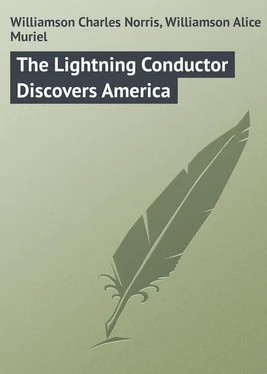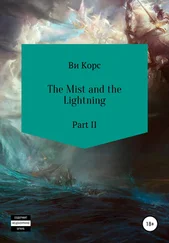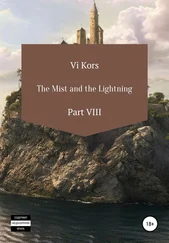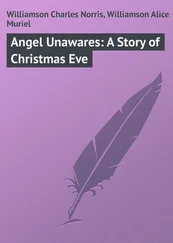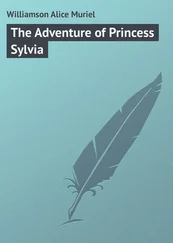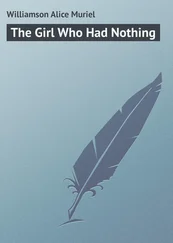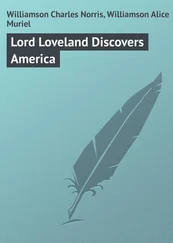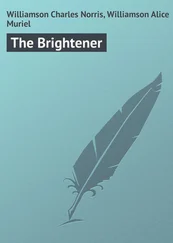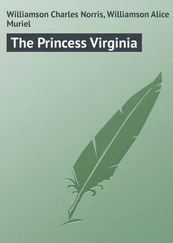Alice Williamson - The Lightning Conductor Discovers America
Здесь есть возможность читать онлайн «Alice Williamson - The Lightning Conductor Discovers America» — ознакомительный отрывок электронной книги совершенно бесплатно, а после прочтения отрывка купить полную версию. В некоторых случаях можно слушать аудио, скачать через торрент в формате fb2 и присутствует краткое содержание. Жанр: foreign_prose, на английском языке. Описание произведения, (предисловие) а так же отзывы посетителей доступны на портале библиотеки ЛибКат.
- Название:The Lightning Conductor Discovers America
- Автор:
- Жанр:
- Год:неизвестен
- ISBN:нет данных
- Рейтинг книги:5 / 5. Голосов: 1
-
Избранное:Добавить в избранное
- Отзывы:
-
Ваша оценка:
- 100
- 1
- 2
- 3
- 4
- 5
The Lightning Conductor Discovers America: краткое содержание, описание и аннотация
Предлагаем к чтению аннотацию, описание, краткое содержание или предисловие (зависит от того, что написал сам автор книги «The Lightning Conductor Discovers America»). Если вы не нашли необходимую информацию о книге — напишите в комментариях, мы постараемся отыскать её.
The Lightning Conductor Discovers America — читать онлайн ознакомительный отрывок
Ниже представлен текст книги, разбитый по страницам. Система сохранения места последней прочитанной страницы, позволяет с удобством читать онлайн бесплатно книгу «The Lightning Conductor Discovers America», без необходимости каждый раз заново искать на чём Вы остановились. Поставьте закладку, и сможете в любой момент перейти на страницу, на которой закончили чтение.
Интервал:
Закладка:
Meanwhile, Monty (who is as ignorant of this country as Jack was only the other day) clamours for J.'s "impressions of America." Since Jack can't put them on paper, I will. I know all his most topographical thoughts, because he's trying them – not "on a dog" but on me, while I drive the car to save his good right arm. "The Lightning Conductor Discovering America" I call him, as everything surprises and interests him so hugely, you would think he was an "O Pioneer!" Long Island isn't your "pitch," Mercédes dear, and you don't know much about it from the inside, so to speak. You may imagine, therefore, that it's a small, sophisticated spot on the map for us to discover . But there's where you're wrong, my dear! It's not small and it's not sophisticated. It may look tiny on paper, but it feels far from tiny when you set forth to motor over it. It feels about the size I used to picture England before I went abroad.
Jack fancied (he dared not say so to me till he could add "I made a big mistake") that America was new and indigestible, like freshly baked bread. As for Long Island, he visioned it as a seaside suburb of New York. Now, he's so fascinated with Awepesha and its environment that he's simply bolting history by the yard! You know, he always was keen on that sort of thing when he travelled; but like most Britishers he flattered himself that he had been born knowing all that was worth knowing in the history of the United States: a little about the Revolution and the Civil War, and " – er – well really, what else was there, you know, if you'd read Cooper and 'Uncle Tom's Cabin' when you were a boy?"
Now, he browses in Cousin John Randolph Payton's respectable library, where every book is bound like every other book in "half calf," and he sees that things began to wake up over here several hundreds of years ago. He has even discovered that an ancestor of his was one of the first important settlers of Long Island, apparently a perfect pig of a man who was horrid to innocent Indians – charming Indians who believed that Europeans meant what they said. I can't reconcile it with Jack to have had a pig for an ancestor, but he certainly had, at least one. Luckily the tendency has run out in the family ages ago.
But to turn from ancestral pigs to our Island!
Jack says the history of Long Island is the history of the whole country in miniature, like "the world seen through the little eye of a sparrow," as Emerson would have said. In fact, it's Some island, as Emerson would not have said; and of course we think our part the loveliest and historicalest of all. There's more variety in history as well as scenery on this island than in many entire states . You simply take your choice. You say to yourself, "Do I prefer Indian history and names? Or do I prefer the Dutch? Or does my taste run in the direction of the English? Do I want to visit the sites of Indian massacres or Revolutionary battles? Does pirate treasure lure me? Am I thrilled by the adventures of whaling-ships and their brave captains?" When you've chosen, you point your auto's nose in the direction desired. The only thing you couldn't find in the Island's thousand miles of glorious roads – (yes, my child, a thousand miles, to say nothing of the not so glorious ones!) – the only thing, I repeat, would be something completely modern.
That proud statement doesn't sound true, but it is. You could find plenty of new houses, the newest of the new: palaces of millionaires, middle-sized houses of middle-class people who are happier than the happiest millionaires; fantastic cottages for summer folk; cozy cottages of "commuters"; queer colonies of Italians, and even of darkies; but there isn't a foot of Long Island ground on which these palaces and houses and cottages and colonies have sprung up that isn't as historic as European soil. It's enthralling to see how intimately and neatly history here links itself with history on the other side: history of England, France, and Holland; noble names and great events. That's what delights Jack, picking up these links, and fitting them together like bits of jigsaw puzzles. He's absolutely thrilled , and wants to stop the car whenever we come to one of the curiously deformed old trees which still, on country roads, mark the direction of ancient Indian trails. This fad of Jack's leads to awkwardness during our present excursion, as we're part of a weird cavalcade which I'll describe to you later. But just now I can't let you off those trees!
The Indians of different tribes had a way of bending one of the lower boughs of a young oak chosen for the sacrifice, bending it so that it grew horizontally, pointing the way along the trail for the initiated. They would have trees done like that at regular intervals; but if you were a silly European you wouldn't know without being told what the trees meant by sticking out their elbows in that significant way; and so you would stupidly proceed to get yourself lost.
Think what those old trees could tell, if by laying your ear against their trunks you could understand the murmurous whisper inside, like secret voices behind a thick closed door! They look extraordinarily intelligent, thrusting out their long arms and crooking up their elbows, as I said. It's just as if you asked them, "How do I get to the sea?" and they, with Indian reticence, answered with a gesture instead of speech. Some of these arms have grown to such a length and thickness that they look like the bodies of animals. You can imagine little girls and boys riding on them, playing they are on horses. Or you can picture a fair maid and a man sitting side by side on one of those big, low-growing branches, as if it were a comfortable sofa. It would be a lovely place to be proposed to on a summer's day!
Does your respect for Long Island begin to grow? I haven't told you yet a quarter of the things that give it interest.
Our part of the Island, the eastern part, used to be harassed by British cruisers in the Revolution. Also it is the Captain Kidd part. I suppose even Monty knows about Captain Kidd? It seems that he used to be Jack's favourite pirate. When I was at the pirate-loving age I didn't care for Kidd as much as for others, because he had such respectable beginnings. Think, a Scotsman from Greenock of all places! And then he became a pirate not for the fun of flying the black flag like storybook pirates, or because he was disappointed in love, but because he cannily decided that he could gain more by turning pirate than by chasing pirates, which Lord Bellomont, the Governor of New York, had sent him out to do. Worst of all, when he was caught Kidd put the blame on his crew, and vowed that they'd forced him into evil courses. Now that we've a house on Long Island, however, I've taken Captain Kidd to my heart. He belongs more to the Moores of Kidd's Pines than to us, of course, but I value and vaunt him as a neighbouring ghost of distinction.
Both our place and Kidd's Pines are not a great distance from Shelter Island, where one lovely umbrella pine exists, under which the pirate is said to have buried his treasure in 1669. He may have emptied his pockets there one day, but that's nothing to what he seems to have done at Kidd's Pines. Gardiner's Island – very aristocratic and historic – isn't far off, and it was from there Captain Kidd sent word of his arrival to Lord Bellomont, whose famous syndicate he'd betrayed and made a laughing-stock by turning pirate. He had his six-gunned sloop Antonio in harbour there, hoping to "make good" with the authorities; but he must have guessed that there wasn't much chance for him. He must have expected the very thing to happen that did happen: to be arrested with his whole pirate crew, and sent to England in a man-o'-war. If he foresaw that event, he'd not have been silly enough to bury his treasure on Gardiner's Island, where everybody would rush to search for it the minute his back was turned, would he? No, he'd take a few of his most trusty men and make secret night expeditions in boats from Gardiner's Island to some part of the shore far enough away not to come under suspicion. Then he would have to mark the place where the treasure was buried (oh, but a treasure rich and rare, for he'd brought everything away with him when he left his stolen ship, The Quedah Merchant , at San Domingo!), mark it in a way not too conspicuous, but permanent, in case he had the luck ever to get free and come back. No good marking with stones, because some one might build; but what a smart idea to plant trees so valuable that nobody to whom that land was granted would want to destroy them! This is what the canny man of Greenock is supposed to have done. He'd brought the tree-slips from the south when he risked his spying expedition into northern waters. He meant to make a present of them to Lord Bellomont if the Governor were lenient: but the Governor's heart was flinty, and Captain Kidd found softer soil for the planting of his trees.
Читать дальшеИнтервал:
Закладка:
Похожие книги на «The Lightning Conductor Discovers America»
Представляем Вашему вниманию похожие книги на «The Lightning Conductor Discovers America» списком для выбора. Мы отобрали схожую по названию и смыслу литературу в надежде предоставить читателям больше вариантов отыскать новые, интересные, ещё непрочитанные произведения.
Обсуждение, отзывы о книге «The Lightning Conductor Discovers America» и просто собственные мнения читателей. Оставьте ваши комментарии, напишите, что Вы думаете о произведении, его смысле или главных героях. Укажите что конкретно понравилось, а что нет, и почему Вы так считаете.
